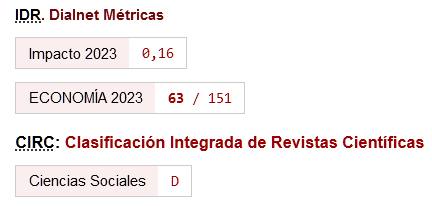El Modelo Social Europeo entre la modernización competitiva y la resistencia frente al neoliberalismo.
Palabras clave:
política social, discurso europeista, neoliberalismo, conflicto socialResumen
El concepto de modelo social europeo es una cuestión recurrente en el discurso europeísta. En este artículo se describe la importante mutación que ha tenido este concepto en las dos últimas décadas. Mientras en un principio se creó para representar la visión de una Europa socialdemócrata realizada por Delors, se ha ido decantando progresivamente como una forma de legitimación del proceso de integración neoliberal, así como para justificar el recorte de los sistemas de bienestar.A pesar de todo, se mantiene la popularidad del modelo social europeo como una alternativa al modelo de capitalismo estadounidense de libre mercado. Por esto la izquierda sigue utilizando el concepto para formular una propuesta de alternativa europea.
Descargas
Citas
ALBER, JENS (2006): The "European Social Model" and the USA. Princeton University Seminar Papers. http://opr.princeton.edu/seminars/papers/Alber_1_S06.pdf
VAN APELDOORN, BASTIAAN (2001): The Struggle over European Order: Transnational Class Agency in the Making of "Embedded Neo-Liberalism." In: Bieler, Andreas, and Morton Adam David (eds.), Social Forces in the Making of New Europe. Houndsmills, Basingstoke, Hampshire: Palgrave.
https://doi.org/10.1057/9781403900814_4
BECKMANN, MARTIN/DEPPE, FRANK/HEINRICH, MATHIS (2006): In schlechter Verfassung? Ursachen und Konsequenzen der EU-Verfassungskrise; in: PROKLA 144/Nr. 3. Zeitschrift für kritische Sozialwissenschaft: Europa, Münster. 307-324. https://doi.org/10.32387/prokla.v36i144.543
BIELER, ANDREAS (2006): What future Union? The struggle for a Social Europe. Paper prepared and presented at the workshop Concepts of the European Social Model, Vienna, 9 June 2006.
BLAIR, TONY (2005): Speech to the EU Parliament. 23 June 2005. http://www.number-10.gov.uk/output/Page7714.asp
BRAND, ULRICH (2006): Strategien progressiver Kräfte in Europa. Rebellische Subjektivität und radikale Forderungen. Thesen; in: Widerspruch 50/06.
DEPPE, FRANK/FELDER, MICHAEL (1993): Zur Post-Maastricht-Krise Europäischen Gemeinschaft (EG). FEG-Arbeitspapier Nr. 10., Marburg.
ESPING-ANDERSEN, GOSTA (1990): Three Worlds of Welfare Capitalism. Princeton: Princeton University Press. https://doi.org/10.1177/095892879100100108
EUROPEAN COMMISSION (1994): European Social Policy - A Way Forward for the Union - A White Paper. COM (94) 333. Brussels.
EUROPEAN COMMISSION (2000): Communication from the Commission to the Council, The European Parliament, the Economic and Social Committee and the Committee of the regions. The Social Policy Agenda. COM (2000) 379 final. Brussels.
EUROPEAN COMMISSION (2004): White Paper on services of general interest. COM (2004) 374, May 2004.
EUROPEAN COMMISSION (2005a): Communication from the Commission to the Council, The European Parliament, the Economic and Social Committee and the Committee of the regions. European values in a globalised world. Contribution of the Commission to the October Meeting of Heads of State and Government. COM (2005) 525 final.
HERMANN, CHRISTOPH (2006): Concepts of the European Social Model. In: The Public Sector, 3-4 2006, IFIP TU Vienna.
HERMANN, CHRISTOPH (2007a): Neoliberalism in the European Union. In: Studies in Political Economy 79 Spring 2007. https://doi.org/10.1080/19187033.2007.11675092
HOFBAUER, INES (2007): Das "Europäische Sozialmodell" als transnationales Modernisierungs- und Legitimationskonzept. In: Kurswechsel 1/2007. Vienna.
HOFBAUER, INES/LUDWIG, GUNDULA (2006): Neue Perspektiven für soziale Gerechtigkeit? Eine kritische Analyse sozial- und gleichstellungspolitischer Leitlinien der Europäischen Union; in: Degener, Ursula/Rosenzweig, Beate (Hrsg.): Die Neuverhandlung sozialer Gerechtigkeit. Feministische Analysen und Perspektiven, Wiesbaden.
HYMAN, RICHARD (2005): Trade Unions and the Politics of the European Social Model, in: Economic and Industrial Democracy, Vol. 26 No. 1, pp. 9-40. https://doi.org/10.1177/0143831X05049401
INTERNATIONAL MONETARY FUND (2004): Euro Area Policies: Selected Issues, IMF Country Report No. 04/235. https://doi.org/10.5089/9781451812954.002
JEPSEN, MARIA/SERRANO PASCUAL, AMPARO (2005): The European Social Model: an exercise in deconstruction; in: Journal of European Public Policy: Vol 15(3), London, 231-245. https://doi.org/10.1177/0958928705054087
KRÄTKE, MICHAEL (2005): Hat das Europäische Sozialmodell noch eine Zukunft?, in: Widerspruch 48 (25.Jg./1. Halbjahr 2005), pp.85-84.
MAHNKOPF, BIRGIT (2007): Das Sozialmodell einer aggressiven Handelsmacht: Zur Funktionalisierung von Sozialpolitik für die Außenwirtschaftsstrategie der EU. In: Kurswechsel 1/2007. Vienna.
METTLER, ANN (2005): European Affairs Winter/Spring 2005.
SAPIR, ANDRÉ (2006): Globalisation and the Reform of the European Social Models, in: Journal of Common Market Studies, Vol. 44 No. 2, pp. 369-90. https://doi.org/10.1111/j.1468-5965.2006.00627.x
URBAN, HANS-JÜRGEN (2004): Sozialpolitik im neuen Europäischen Sozial-modell. http://www.linksnet.de/artikel.php?id=1334
Descargas
Publicado
Cómo citar
Número
Sección
Licencia
Esta licencia permite a terceros compartir (copiar y redistribuir el material en cualquier medio o formato) y adaptar (remezclar, transformar y crear a partir del material para cualquier finalidad, incluso comercial), siempre que se reconozca la autoría y la primera publicación en esta revista (La Revista, DOI de la obra), se proporcione un enlace a la licencia y se indique si se han realizado cambios en la obra.







